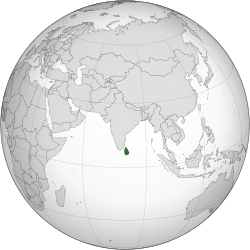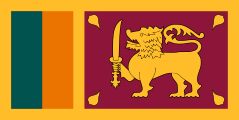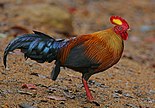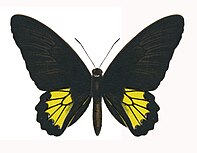National symbols of Sri Lanka
Sri Lanka | |
|---|---|
 |
The national symbols of Sri Lanka are the national anthem, flag, emblem, flower, tree, bird, butterfly, gemstone and sport. They represent the country and its people within Sri Lanka and abroad as well as traditions, culture, history and geography. Several other symbols do not have official acknowledgment as national symbols but are considered national symbols at the local level.[1][2]
The Constitution of the Democratic Socialist Republic of Sri Lanka sets out the national flag, the national anthem, the national day and the national language.[3] The constitution was promulgated by the National State Assembly on 7 September 1978. On 14 November 1987 the Sri Lankan Parliament passed the Thirteenth Amendment to the Constitution of Sri Lanka, which made both Sinhala and Tamil the national languages.[4]
National symbols[edit]
| Title | Symbol | Media | Notes |
|---|---|---|---|
| National anthem | "Sri Lanka Matha" | The national anthem of Sri Lanka "Sri Lanka Matha" is believed to have been written by Rabindranath Tagore[5] and later composed by Ananda Samarakoon in 1940 before the island nation's independence from the British. In 1951, it became the national anthem of Sri Lanka.[6][7] Firstly, it was written in Sinhalese and translated to Tamil. The first performance of the anthem was held in the fourth anniversary of independence day on 4 February 1952.[1] | |
| National flag | Flag of Sri Lanka | 
|
The national flag of Sri Lanka consists of a lion holding a sword in its right fore paw by representing the Sinhalese people and first king. Dark red/maroon background represents Buddhist symbol. Four golden-yellow bo leaves, one in each corner represent Four Sublime States. Around the background is a yellow border that represents Buddhist monk's community. On the left side, two vertical stripes in green and saffron represent Moors and Tamil communities.[8] The current flag was adopted in 1950.[2] |
| National emblem | National emblem of Sri Lanka | 
|
The national emblem of Sri Lanka used by Sri Lankan government is in connection with the administrative purpose and government of the country. The current republican emblem was adopted in 1972 after the country was declared as a republic state.[1] The emblem has a lion, holding a sword in its right fore paw on a maroon background encircled with petals of a blue lotus. Also it features a bunch of paddy, grain vase (punkalasa), dhammachakka, sun and moon.[9] |
| National language | Sinhala / Tamil | The national languages of Sri Lanka are Sinhalese and Tamil.[10] As per Chapter IV (Language), Article 19 of Constitution of Sri Lanka Sinhalese and Tamil have been recognised as national languages.[11] | |
| National flower | Blue water lily flower (Nymphahea Stellata ) |
 |
The blue water lily was declared the national flower of Sri Lanka on 26 February 1986.[12] It is found in all parts of the island and grows mainly in shallow water. The flower is considered a symbol of truth, purity and discipline. It has connections with Buddha and was used as ceremonial flower in Sri Lanka throughout history.[13][14] |
| National tree | Ceylon ironwood (Mesua ferrea) |

|
Ceylon ironwood (naa) was declared the national tree of Sri Lanka on 26 February 1986. It was chosen as the national tree due to its endemism in Sri Lanka, utility, historic & cultural importance, exterior posture, wide distribution, colour and nature and ability to draw and sketch easily.[2] Theravada Buddhism considers this tree for achieved enlightenment.[15] The tree has been utilised for various purposes since ancient times.[16] |
| National bird | Sri Lankan junglefowl (Gallus lafayetii) |

|
The Sri Lankan junglefowl is the official national bird. The colourful bird is endemic to Sri Lanka and commonly found in national parks, jungle and dense scrub. It is an endemic bird of Sri Lanka.[17][18] |
| National butterfly | Sri Lankan birdwing (Troides darsius) |

|
Sri Lankan birdwing is endemic to Sri Lanka and was declared as the national butterfly with a connection to the butterfly conservation action plan. The largest Sri Lankan butterfly was categorised as flagship species due to its wide distribution. It has glossy black and bright yellow colours and an attractive pattern.[19][20] |
| National gemstone | Blue sapphire | 
|
The blue sapphire was declared the national gemstone of Sri Lanka in October 2003. A postage stamp worth LKR 4.50 was issued on 2 October 2003 to mark the announcement. Sri Lanka is famous for blue sapphires, especially known for their size.[21] |
| National sport | Volleyball | 
|
Volleyball was officially recognised as the national sport of Sri Lanka in 1991.[22] The sport was introduced in 1916 to Sri Lanka. However, there is an opinion that Sri Lankans played a similar sport before its introduction.[23] Elle had recognition as a national sport before volleyball.[24] |
Unofficial[edit]
Here are list of national symbols that have no official status.
| Title | Symbol | Media | Notes |
|---|---|---|---|
| National animal | |||
| Sri Lankan elephant (Elephas maximus maximus) |
There is no official national animal in Sri Lanka even though the elephant, lion, and grizzled giant squirrel are locally considered as such. Lions are the most celebrated animal for Sinhalese people, symbolising heraldry. The Sri Lankan lion is a prehistoric subspecies of lion.[25] | ||
| Lion (Panthera leo) |

| ||
| National monument | Independence Memorial Hall | Independence Memorial Hall is an iconic structure commemorating the independence of Sri Lanka from the British rule. Named "Magul Maduwa" (Celebration Hall), its structure is based on the Royal Audience Hall of the Kingdom of Kandy, the last kingdom that fell to colonial occupation in the island. It also known as Independence Commemoration Hall and Independence Commemoration Hall.[26][27] | |
| National dress | Sarong/dhoti & shirt (men) Sari (women) |

|
Sri Lanka does not acknowledge any national dress since there are three major communities and a few minor communities. Commonly, men's traditional dress is the sarong/dhoti and shirt and women's traditional dress is a sari. The three major communities (Sinhalese, Tamils, Muslims) have significant differences in their regional dress although the majority of them wear Western dress today.[28][29] |
| National dish | Rice and curry | 
|
Rice and curry is a popular dish in Sri Lanka. The dish has cooked rice with various curry dishes of vegetable and/or meat.[30][31] |
See also[edit]
Further reading[edit]
- Wimalaratne, K. D. G. (2006). National Symbols of Sri Lanka. Kishers & Distributors. p. 40. ISBN 9789551277093.
References[edit]
- ^ a b c "The identity of Mother Lanka". Sunday Observer. 29 January 2012. Archived from the original on 16 February 2015. Retrieved 1 December 2014.
- ^ a b c Wimalaratne, K D G (2013). National Symbols Of Sri Lanka. Sri Lanka: Sarasavi Publishers. ISBN 978-9553101198.
- ^ "Constitution of the Democratic Socialist Republic of Sri Lanka". PressInform. Data and Information Unit of the Presidential Secretariat. Archived from the original on 18 November 2014. Retrieved 3 December 2014.
- ^ Martyn, Sabina (16 January 2013). "In Post-Conflict Sri Lanka, Language is Essential for Reconciliation". Asia foundation. Retrieved 3 December 2014.
- ^ Habib, Haroon (May 18, 2011). "Celebrating Rabindranath Tagore's legacy". The Hindu. Retrieved December 1, 2014.
- ^ Bandaranayake, Senake (1996). Ivan Peries paintings, 1938–88. Colombo: Tamarind Publications. ISBN 9559458000. page 155
- ^ "Man of the series: Nobel laureate Tagore". The Times Of India. Apr 3, 2011. Retrieved December 1, 2014.
- ^ "National Symbols". Embassy of Sri Lanka in Russia. Archived from the original on 20 June 2015. Retrieved 1 December 2014.
- ^ "Sri Lanka Country Information". Sri Lankan Consulate in Los Angeles. Archived from the original on 7 November 2010. Retrieved 2 December 2014.
- ^ "Official Languages". Department of Official Languages. Archived from the original on 19 December 2014. Retrieved 27 December 2014.
- ^ "Constitution of the Democratic Socialist Republic of Sri Lanka, Ch-V,19". Government of Sri Lanka. 1978. Archived from the original on 3 February 2003. Retrieved 27 December 2014.
- ^ "National Flower". www.srilanka.org.tr. Retrieved 2023-04-26.
- ^ "National flower". Retrieved 2 December 2014.
- ^ Hettiarachchi, Kumudini (7 November 2010). "The 'great pretender'". The Sunday Times (Sri Lanka). Retrieved 2 December 2014.
- ^ Epasinghe, Premasara (21 November 2013). "Initial Buddhist missionary activities". Daily News (Sri Lanka). Archived from the original on 19 June 2015. Retrieved 2 December 2014.
- ^ "Notes on the Geography of Sri Lanka: Embekke". The Great Mirror. Retrieved 2 December 2014.
- ^ "Country Overview". Government of Sri Lanka. Retrieved 2 December 2014.
- ^ "Ceylon junglefowl – National Bird of the country". The Sunday Times (Sri Lanka). Retrieved 2 December 2014.
- ^ Rodrigo, Malaka (March 28, 2010). "Sri Lanka names its national butterfly". The Sunday Times (Sri Lanka). Retrieved 2 December 2014.
- ^ "National Butterfly". Daily News (Sri Lanka). March 25, 2010. Archived from the original on March 29, 2015. Retrieved December 2, 2014.
- ^ "Blue Sapphire – the national gemstone". The Sunday Times (Sri Lanka). Retrieved 2 December 2014.
- ^ "Volleyball – The national game of Sri Lanka". Sri Lanka Volleyball Federation. Archived from the original on 30 March 2018. Retrieved 2 December 2014.
- ^ Marikar, Hafiz (12 June 2014). "How volleyball came into being". Daily News (Sri Lanka). Archived from the original on 19 June 2015. Retrieved 2 December 2014.
- ^ "Volleyball, Sri Lanka's National Sport". The Island (Sri Lanka). September 10, 2011. Retrieved 2 December 2014.
- ^ "Panthera leo". International Union for Conservation of Nature and Natural Resources. Retrieved 30 January 2015.
- ^ "Independence Memorial Hall". The Nation (Sri Lanka). 2 February 2012. Archived from the original on 20 August 2013. Retrieved 2 December 2014.
- ^ "Independence Square". Colombo Guide. Retrieved 30 January 2015.
- ^ "National Dress". My Sri Lanka. Retrieved 1 December 2014.
- ^ Dikkumbura, Sampath. "Sri Lanka Traditional Dress". Retrieved 30 January 2015.
- ^ "Sri Lanka Rice & Curry". Go Lanka. Retrieved 30 January 2015.
- ^ "Discover the many flavours of Sri Lanka". Lonely Planet. Retrieved 30 January 2015.
